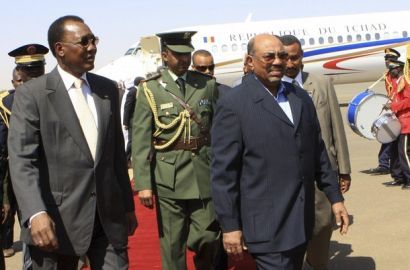Chad’s Deby in Sudan supporting normalization process
February 8, 2010 (KHARTOUM) — Chad’s President Idriss Deby arrived today to Khartoum for the first time in more than six years, reaffirming his readiness to work together with his Sudanese counterpart to improve bilateral ties.

Ever since the first year of the Darfur rebellion, Sudan and Chad had been trading accusations that the other supported rebel groups and interfered in internal affairs, but last October the President Deby considered an offer made by Khartoum to end hostilities and stop support to rebel movements based on both sides of the borders.
In the Sudanese capital, Deby was welcomed at the airport by President Omer Al-Bashir with traditional musical troupes from the two countries and an important Chadian community reminding him ancestral relations between the two countries.
“We extend our hands for peace,” said Deby after his arrival to Khartoum adding his visit to Sudan reflects a true will to normalize relations between the two countries and a commitment to peace and stability in both countries. He further pointed to the eternal ties that bind the two peoples.
Deby further underscored that the two leaderships have to take the needed political decisions allowing them to restore bilateral “relations better than they were in the past”.
Sudanese President Al-Bashir stressed Sudan’s seriousness to improve ties between Khartoum and Ndjamena pointing out that relation between the two countries should not be affected by difference between the two governments.
“We are able to restore (bilateral relations) to better than they were as long as we have a real will and and sincere desire,” Bashir said.
Last week the two countries signed a technical protocol on the establishment of the 3000-strong joint border force that will be led by a Sudanese commander during the first six months. The presence of armed opposition groups is a key issue in the troubles between the two countries.
Sudan sees Chad as the one who started to provide support to rebel groups in Darfur and also considers that it can control Chadian opposition more easily than Ndjamena can manage Darfur rebels. Deby has tribal links with the leader of the rebel Justice and Equality Movement, Dr Khalil Ibrahim. But other rebel groups too have families and relatives in Chad.
During the first year of the Darfur rebellion different reports mentioned that Deby was hostile to any support to the rebels but influential figures within the regime violated his orders due to the tribal links they have with Sudanese rebels.
Despite the significant support in the recent years, relations between JEM and Chad have reportedly faced some turbulence since last summer. The important military presence of the Sudanese rebels inside the country and near the border was a “cause for concern” for President Deby, say Western diplomats.
President Bashir and Deby this evening called Libyan leader Muammar Gadhafi, Saudi Arabian King Abdullah bin Abdulaziz, Egyptian President Hosni Mubarak, Senegalese President Abdoulaye Wade and the Emir of Qatar Hamad bin Khalifa al-Thani to thank them for the efforts they made to reconcile them. The presidents pledged to send them a joint delegation soon.
Improvement of ties between the two countries is seen as major step toward ending the seven year conflict in Darfur. Sudan considers that Chad can persuade the rebel groups in Darfur and deliver them to the negotiating table in order to resolve the conflict.
Also, Sudanese Bashir is running within two months for his reelection. But, he could be of good help to Deby in order to seal a reconciliation deal with the Chadian opposition before the holding of a legislative election in Chad scheduled for November 2010. President Deby also is expected to seek the renewal of his tenure in April 2011 when the presidential election will be held in Ndjamena.
(ST)
